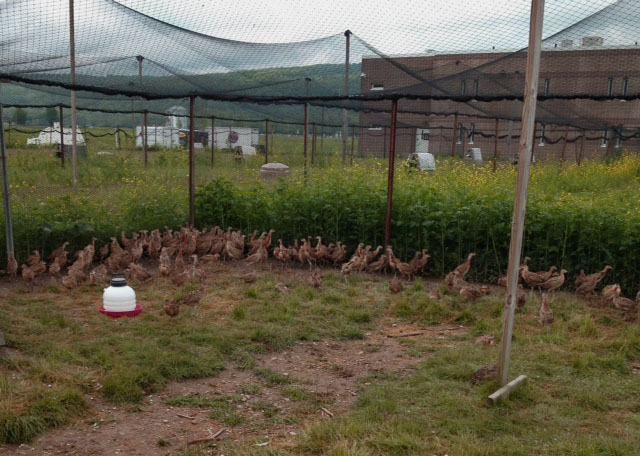Allegany County Pheasant program impacted
About 500 birds died from the flu, the remaining thousands were euthanized
By Andrew Harris, photo by Dan Jordan Photography and Consulting
A highly contagious strain of bird flu appeared last week in the only NYS game farm used to breed and raise an invasive species, the ringed-neck pheasant. The bird has long been raised to be released at private shooting clubs and into the wild. These pheasants, native to Asia, are used to create a synthetic population in order to create “hunting opportunities.”
The farm was put under quarantine and the flock has been “depopulated” over the last week in an attempt to contain the outbreak.
The Allegany County Sheriff’s department manages the “Allegany County Pheasant Program,” raising hundreds of pheasants using an inmate work program. Those birds are all released into the wild each year for to hunting purposes at locations around the county. That program recieveds chicks and eggs from the Reynolds Game Farm. We asked Sheriff Scott Cicirello about the impact on the county program:
“I was informed that there was an outbreak of avian flu that may effect our ability to get birds. My understanding is that the flu may also effect eggs. We are waiting to hear what we can expect.”

Here is the full released from the NYS DEC about the outbreak:
DEC Announces Confirmed Outbreak of Highly Pathogenic Avian Influenza at Reynolds Game Farm
The New York State Department of Environmental Conservation (DEC) today announced that the U.S. Department of Agriculture’s (USDA) National Veterinary Services Laboratory confirmed an outbreak of Highly Pathogenic Avian Influenza (HPAI) virus affecting the Reynolds Game Farm pheasant population.
DEC began investigating suspicious deaths at the Game Farm, located near Ithaca in Tompkins County, on March 20 and initial test results indicated a possible outbreak of the H5N1 avian influenza (AI) virus. On March 21, the farm was put under quarantine following positive test results from the Cornell Wildlife Health Lab. A full 120-day quarantine period for the farm is required. This week, at least 500 of DEC’s breeder flock of 6,600 pheasants died from HPAI.
DEC is working closely with animal health experts at the New York State Department of Agriculture and Markets (AGM) and the USDA National Veterinary Services Laboratory and following standard protocol for an outbreak of HPAI.
Cooperatively managed by DEC, AGM and USDA, the remaining breeder flock of pheasants on the property is being depopulated to prevent the spread of the disease in accordance with standard HPAI response protocols. Birds from the flocks will not enter the food system. As part of existing avian influenza response plans, AGM and USDA are working jointly on additional surveillance and testing in areas around the affected flock. Additional information on the USDA response plan can be found at USDA APHIS | Highly Pathogenic Avian Influenza (HPAI) (leaves DEC website).
The Centers for Disease Control and Prevention (leaves DEC website) states that the recent HPAI detections in birds do not present an immediate public health concern. HPAI cases in humans are rare, and symptoms are typically mild. The risk of a person becoming infected is low.
DEC will continue to work with partners at AGM and USDA in a swift and thorough response to the outbreak.






